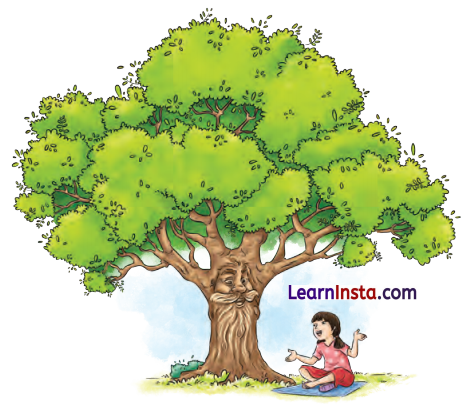Neem Baba Class 6 Summary in English
Amber engages in a conversation with the neem tree Neem Baba, in her courtyard, learning about its significance and uses. Neem Baba reveals its ancient origins in North India or Myanmar and its spread across Asia, Africa, and even parts of America.
The tree explains its various names, including ‘Neem’ given by Iranians, and its importance as a medicinal tree known for its ability to cure diseases and repel insects.

Amber discovers that neem leaves are used in traditional remedies like treating measles due to their anti-microbial properties. Neem bark and flowers are also used in medicines for coughs and eye ailments.
Neem seeds and oil are effective against pests and insects, protecting crops and stored grains without harmful chemicals.
![]()
Neem’s wood is resistant to termites, and its oil is used in soaps and toothpaste. Neem Baba emphasizes the importance of using neem remedies under expert guidance.
This chapter portrays neem as a versatile and beneficial tree deeply rooted in Indian culture and widely recognized globally for its medicinal and ecological significance. Amber gains a deeper appreciation for neem’s role in health, agriculture, and environmental sustainability through her conversation with Neem Baba.
Neem Baba Word Meanings in English
whispering – speaking very softly, especially to avoid being overheard,
courtyard – an enclosed area, typically open to the sky, within a building or group of buildings,
millions – a very large number, typically more than a thousand thousands,
spread – extend over a large area,
thought-provoking – causing careful consideration or thought,
arishta – a Sanskrit name meaning ‘the one who cures diseases’,
iranians – people from Iran, a country in Western Asia,
nimba – another name for neem tree in Sanskrit,
nimbaca – another Sanskrit name for neem tree,
leemba – a regional name for neem tree in India,
nimori – a variation of neem’s name used in some regions,
nimbamond – another regional name for neem tree,
![]()
nimo – a colloquial name for neem tree in some areas,
grace – kindness,
bitter – having a sharp, pungent taste; not sweet,
nature – the phenomena of the physical world collectively, including plants, animals, the landscape, and other features and products of the earth,
cleanliness – the state or quality of being clean; the practice of keeping oneself
and one’s surroundings clean,
parting – the action of leaving or being separated from someone,
chemical properties – characteristics related to chemicals, referring to how substances behave in chemical reactions,
germs – microorganisms, especially those causing disease,
itching – an uncomfortable sensation on the skin that causes a desire to scratch,
comfort – a state of physical ease and freedom from pain or constraint,
breed – to produce offspring, especially animals or plants,
locusts – large insects that sometimes migrate in vast swarms and can cause extensive damage to crops,
mosquito breeding – reproduction of mosquitoes,
crop yield – agricultural production,
termites – small insects that feed on wood and can cause extensive damage to wooden structures and crops,
breeding – production of offspring, especially animals or insects,
stagnant – not flowing or moving, often referring to water that is not fresh,
cost-effective – producing good results without costing a lot of money,
purifies – cleanses or makes something pure or free from impurities,
qualities – characteristics or features of something.